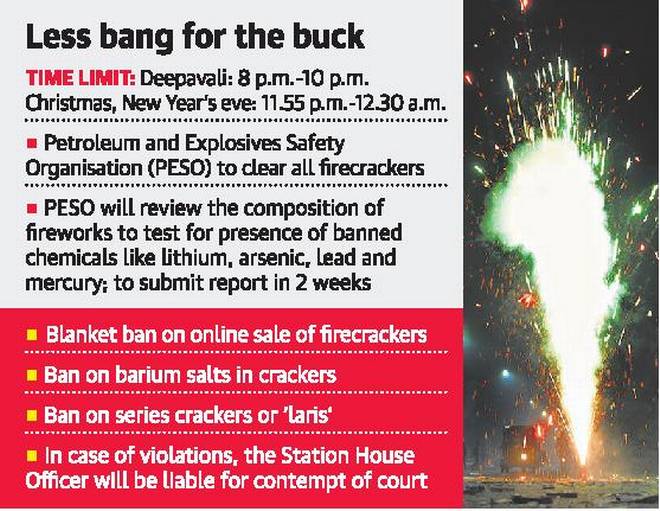1 . SC moves to make festivals less noisy

Important Points
- Allowing the manufacture and sale of only “green” and reduced-emission or “improved” crackers, while banning those that are loud and toxic to man, animal and the environment.
- Judgment reduced the time for bursting crackers during Deepavali and other festivals to two hours: between 8 p.m. and 10 p.m. For Christmas and New Year, the time slot allowed is just half-an-hour, between 11.55 p.m. and half-past midnight. The reduced time window is applicable across the country
- The sale of green and improved crackers would be only through licensed traders. It banned online sale through e-commerce websites, including Flipkart and Amazon
- The judgment said though the right to health was part of the fundamental right to life under Article 21 and assumed “greater importance,” the “endeavour” of the court right now was to strive for a balance between the right to public health and the right to occupation of the industry
2 . No change in stand on Azhar: China
Important Points
- China on Tuesday reiterated that it had not shifted from its stance of refusing to recognise Masood Azhar as an international terrorist, despite the marked improvement in New Delhi-Beijing security ties following the Wuhan summit
3 . Bangladesh question looms over Citizenship Bill
- The Bill, introduced in the Lok Sabha on July 15, 2016, seeks to amend the Citizenship Act, 1955 to provide citizenship to illegal migrants, from Afghanistan, Bangladesh and Pakistan, who are of Hindu, Sikh, Buddhist, Jain, Parsi or Christian extraction.
- However, the Act doesn’t have a provision for Muslim sects like Shias and Ahmediyas who also face persecution in Pakistan.
- The Bill also seeks to reduce the requirement of 11 years of continuous stay in the country to six years to obtain citizenship by naturalisation.
- The Bill after been discussed in the Lok Sabha and was referred to a joint select committee in August 2016
- JPC members now want to exclude Bangladesh from the list
4 . In the net
Important Points
- The total number of tax returns filed in the country increased by over 80% over the last four financial years
- Direct tax to GDP ratio rose to 5.98% in 2017-18, the highest it has been in the last 10 years
- This rise in tax compliance has been attributed to the various measures taken by the Union government to increase compliance, including better gathering of information about sources of income, ease of getting refunds, and lowering of various other tax compliance costs
- Most of the rise in the total tax collection in the last few years has come from indirect tax collections. This year, direct tax collection increased at a higher rate compared to the collection of indirect taxes
- Further increase in the share of direct taxes will help the government to lower regressive indirect taxes that impose a significant burden on the poor.
5 . Constitution bench to look at plea on ‘independent mechanism’ for appointment of CEC, ECs – Indian Express
Important Points
- The Supreme Court on Tuesday referred to a Constitution Bench a petition seeking an independent mechanism for appointment of the Election Commissioners outside the exclusive powers of the government
- Court will look upon the interpretation of Article 324 of the Constitution of India.
- The petition said there is a need for a foolproof and better system to appoint Election Commissioners. It sought a direction to the Centre to constitute a “neutral and independent selection committee” to recommend names for the post of Chief Election Commissioner and Election Commissioners
6 . India had most outward migrants in 2017: ADB
Important Points
- Most of the international migrants in 2017 were from India, followed by China and Bangladesh, an Asian Development Bank (ADB) report
- The report also said intraregional migrants to India largely come from neighbouring countries such as Bangladesh (3.1 million), Pakistan (1.1 million) and Nepal (0.5 million)
- The United Nations (UN) recommendations on statistics of international migration define the ‘stock of international migrants present in a country’ as ‘the set of persons who have ever changed their country of usual residence, that is to say, persons who have spent at least one year of their lives in a country other than the one in which they live at the time the data are gathered
- International migrant stock consists of persons crossing borders for various reasons—for employment, family reunification, study, and fleeing from conflicts and violence
Kindly provide news recap for 25th and 26th October